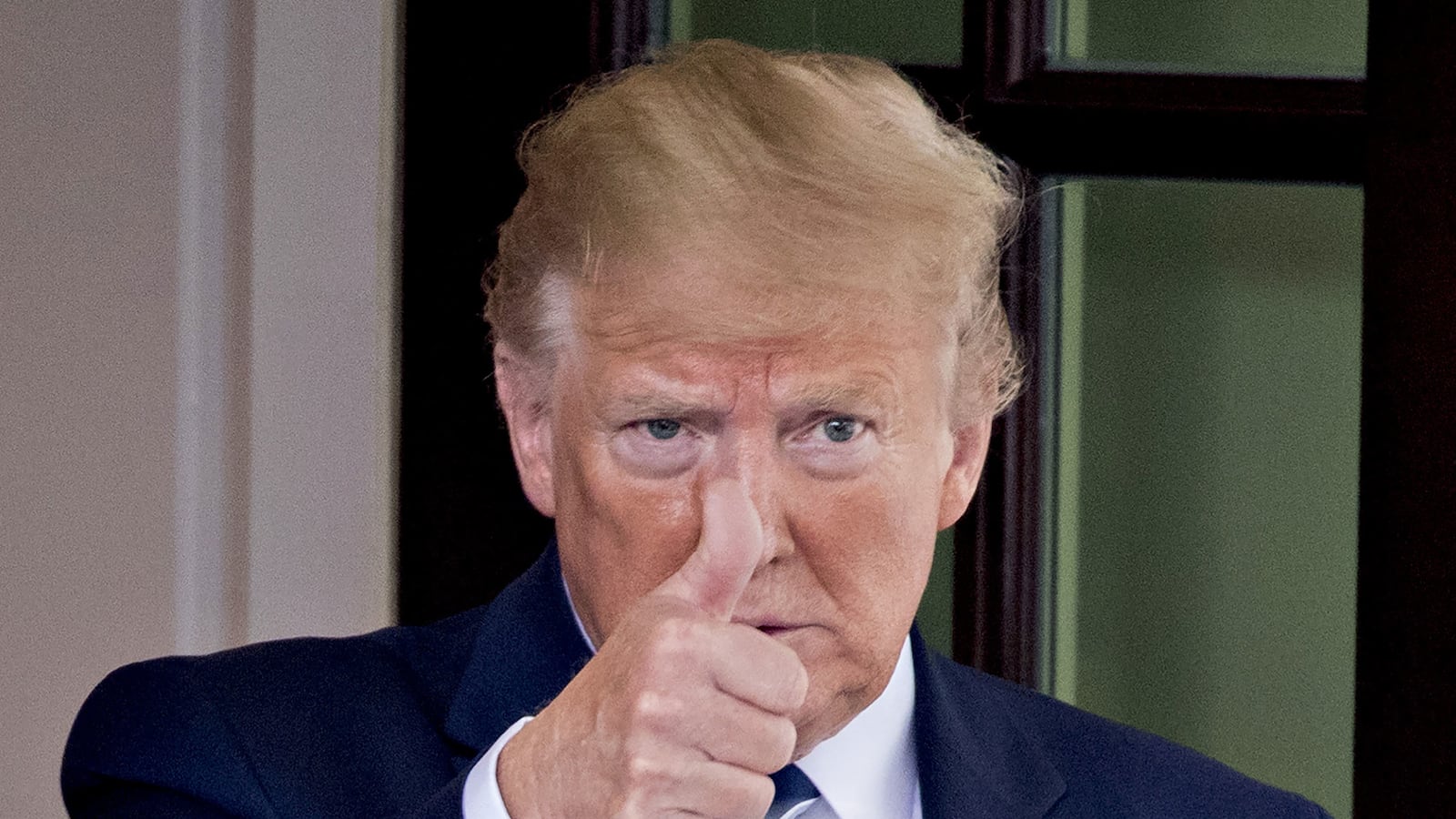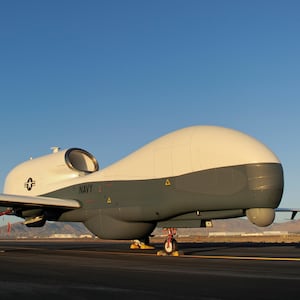This column was updated June 22, 2019, at 4:00 a.m. EDT
PARIS—Could American policy toward Iran look any more reckless, feckless, or just plain nuts? One is tempted to ask: What happens when your actions are based on a madman theory, but conducted by an actual madman?
Nothing good. And the last few hours are an illustration. On Thursday, the Iranians shot down a big, high-flying, very, very expensive unmanned American surveillance drone that they say was in their airspace near the strategic Strait of Hormuz. The Americans say the drone was over international waters, and administration hawks wanted to teach a lesson to whoever in Iran had the effrontery to do such a thing.
Then President Donald J. Trump went on a confusion offensive, starting with a tweet saying Iran had made a “big mistake!” A few hours later during a photo op with Canada’s prime minister, Trump doubled down on the befuddlement by saying he thought shooting the drone might have been a mistake like, you know, an accident, but hinted there would be a big bad response.
Overnight we read reports he had indeed ordered attacks on Iranian installations, sending ships speeding across the seas and planes soaring into the air, but then changed his mind and had everybody stand down.
Friday morning, after fulminating about other topics like “the Russia Collusion Hoax,” the president took to Twitter again to do a little Trumpsplaining, insisting in a series of excited tweets that after the drone was shot down (on Monday, he said, contrary to all other information), “We were cocked & loaded to retaliate last night on 3 different sights [sic] when I asked, how many will die. 150 people, sir, was the answer from a General. 10 minutes before the strike I stopped it, not … … proportionate to shooting down an unmanned drone.”
Later in the day, Trump said the planes hadn't taken off when he made his decision. As The Daily Beast reported he had been fully informed about the potential body count in earlier briefings, even though he presented it to NBC's Chuck Todd on Friday as if it were a sudden revelation. Trump's stand-down decision was a last-minute second-guess.
So, back to our original question: Is there method to this madness? The increasingly obvious answer is no, in the sense of any coherent long-term policy or strategy. But Trump’s actions do have their own internal logic.
First of all, the president may be a warmonger, but his weapon of preference is the dollar, using tariffs and sanctions to try to bring other leaders to their knees. He dreads the idea of conventional wars in far away places.
Trump is also the man who paid $94,801 in 1987 to place ads in The New York Times, The Washington Post, and The Boston Globe attacking President Ronald Reagan's naval deployment in the Persian Gulf to defend oil tankers from Iranian attacks (yes, this history is redundant). Trump’s full page advertisements said the world was laughing at American politicians for protecting "ships we don't own, carrying oil we don't need for allies who won't help." One might say the same thing today, and Trump knows it.
Trump listens, up to a point, to U.S. generals itching to give Iran a "bloody nose," and to the Boltons and Pompeos who fantasize about regime change. But Donald “Art of the Deal” Trump's objective always was and remains to get a better deal with Iran than Barack Obama did, which, as he made clear in his Friday tweetstorm, was why he provoked this crisis in the first place by pulling out of the nuclear accord last year.
In his view, Iran must face economic annihilation, he's good with that, but if it leaves the deal that he left and looks like it is racing to build nuclear weapons then, as he told Chuck Todd, it will face "obliteration."
It must gall Trump to realize, as some day he must, that Iran is not going to bend—just as North Korea has, in fact, not bent—and if he ever gets any new deal, we will all be lucky if it is as good as the one Obama got.
The best thing about Trump is his aversion to war. The worst is his addiction to tough-guy posturing. Where Iran is concerned, the combination is a series of bluffs that beg to be called. And the mullahs and Islamic Revolutionary Guard Corps will keep testing.
What they are learning is that there’s not likely to be any "obliteration." More likely there will be what Trump called “proportionate” response by American forces, a tactic with which the Middle East is mightily familiar. It was the characteristic of the long-forgotten “Tanker War” that Reagan waged and Trump deplored back in 1987 and 1988.
Ambassador Barbara Bodine, who was central to the State Department end of that operation 32 years ago, and now heads the Institute for the Study of Diplomacy at Georgetown University, notes that the Iranians, famous as chess masters and poker players, “are not generally rash.”
“One of the things that struck me at the time of the tanker protection regime [in ’87-’88] and even more so in retrospect is that they seemed to calculate very carefully how far they could push and not get a reaction from us, and we were very careful about how far we could push them,” she says. “That went on for two years.”
The critical moment will come if or when American personnel are killed, which would fit a classic pattern when an American administration wants to go to war. It starts with picking villains, then picking fights, piling on economic pressure and carrying out a series of provocative moves to push the bad guys into a corner, until someone at some level in the target regime kills an American.
Then the U.S. responds with a major military action, very likely including "decapitation" as the Americans try to knock off the top guy in the regime. The U.S. attacks on Libya in 1986 after a disco bombing in Berlin and the invasion of Panama in 1989 after a violent traffic stop near the Canal Zone would be two examples.
Provoking Saddam Hussein to lash out violently was the clear goal of the Bush administration in 2002, but Saddam did not fall for it. So Bush opted instead for the WMD myth and assorted other fictions to force the issue and invade in 2003. More recently, Venezuelan dictator Nicolas Maduro has avoided the trap, and it's reported that Trump, unable to achieve the easy "win" against him that he expected, has lost interest.
If we continue on the present course desired by National Security Advisor John Bolton and the other hawks, when and how might the deadly moment come with Iran?
It could happen at the hands of Iranian-backed militias in Syria or in Iraq, which are full of hotheads not always completely under Iran's control. In Iraq, confusingly, they are backed as well by the government the U.S. supports. Over the last few days there have been rockets and mortars launched at compounds that house American military personnel and workers with oil companies.
And there is also the possibility that action by a third party will spark the conflagration. A classic case came in June 1982 with the very nearly successful attempted assassination of Israel's ambassador to the U.K. It was used as a pretext by Israeli Prime Minister Menachem Begin to invade Lebanon and try to crush Yasser Arafat's PLO, which had frustrated Begin by observing a ceasefire on the ground that deprived him of the excuse he needed. In fact, the attack on the ambassador was carried out by members of the Abu Nidal organization, fierce rivals of Arafat, who were backed by Saddam Hussein.
Such events have huge unintended consequences: After the U.S. bombing raids on Tripoli and Benghazi in 1986, Libyan leader Muammar Gaddafi hugely increased his terror operations against the U.S. and U.K., including the downing of Pan Am 103 over Lockerbie, Scotland, and an enormous arsenal sent to the IRA. The Israeli invasion of Lebanon led to the creation of Hezbollah, the U.S. Marine Barracks bombing, and so on and on. Panama turned out OK. But Iraq, not so good.
Thus do the shifting sands of the Middle East become quicksands, or, if you will, quagmires.







